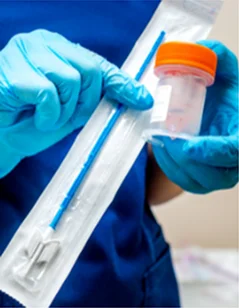Cervical cancer was once a leading cause of death among women, but the incidence and mortality rates have declined significantly over the past 40 years. This is due to increased awareness and regular cervical cancer screening, primarily with Pap smear tests. When abnormal cell changes are caught at precancerous stages, steps can be taken to prevent progression to full-blown cancer.
Understanding what Pap smears entail, why they should be done regularly, and how they help prevent cervical cancer can empower women to take charge of their health.
What is a Pap Smear?
A Pap smear, also known as a Pap test, is a simple and quick procedure to collect cells from the cervix. The cells are examined under a microscope to detect any precancerous or cancerous changes. It is recommended for all women between ages 21 to 65 years.
During a Pap smear, the doctor gently inserts an instrument called a speculum into the vagina to visualize the cervix. Using a brush or spatula, sample cells are collected from the outer opening of the cervix and endocervix. This cell sample is sent to a lab for evaluation.
Some key points about Pap tests:
●It screens for not just cancer, but cell changes that may lead to cancer if untreated. This allows early intervention.
●The test is not usually painful and only takes a couple of minutes.
●No prior preparation is needed. You don't need to fast or make dietary changes.
●Just avoid vaginal lubricants, creams or douches for 1-2 days before the test as they can obscure cell samples.
Why Regular Pap Smears Matter?
Here are some key reasons why women should get regular Pap smears:
- Early Detection: Pap smears allow abnormal precancerous cell changes to be caught at the earliest stages before they progress to actual cancer. Finding issues early dramatically improves survival outcomes.
- Prevent Cancer: Catching abnormal changes early means steps can be taken to remove the abnormal cells before they ever turn cancerous. Precancerous lesions can be treated before cervical cancer develops.
- Reduce Mortality: Cervical cancer was a leading cause of death for women. But cancer deaths have reduced by over 50% in the last 30 years thanks to screening. Early detection saves lives.
- Peace of Mind: A normal Pap test provides reassurance that cells are healthy with no issues detected. This gives peace of mind.
- It’s Quick: Pap smears only take 2-5 minutes to complete as part of a routine pelvic exam. There's no major preparation needed.
Guidelines for Pap Smear Frequency
Medical organizations recommend the following Pap smear guidelines:
- Women ages 21-29: Pap test every 3 years.
- Women ages 30-65: Pap test every 3 years, or HPV test with Pap test every 5 years.
- Over 65: No screening needed after age 65 if prior tests normal for 10 years. Discuss with your doctor.
- After hysterectomy or partial hysterectomy, discuss with your gynaecologist.
Ensure you get a Pap smear at least every 3 years, or based on your doctor’s recommendation. Schedule the next test before you leave the clinic.
Abnormal Pap Smear Results
If your Pap test detects any abnormal cells, do not panic. There are several stages of abnormal changes ranked by severity:
ASCUS: Atypical Squamous Cells of Undetermined Significance. Mild cell changes.
LSIL: Low-Grade Squamous Intraepithelial Lesion. Mild to moderate cell changes.
HSIL: High-Grade Squamous Intraepithelial Lesion. More severe changes at higher risk of becoming cancer.
Your doctor will recommend next steps based on the extent of abnormality. This may involve:
- Repeat Pap smear at shorter interval
- HPV testing to check for virus causing cell changes
- Colposcopy exam to directly visualize the cervix
- Biopsy of abnormal areas
- LEEP procedure to remove abnormal tissue
- Close monitoring without immediate treatment
The key is diligent follow-up and treatment as needed so any abnormal cells are eliminated before they become cervical cancer.
The Pap Smear’s Vital Role in Preventing Cervical Cancer
Thanks to the Pap smear test, cervical cancer is now one of the most preventable cancers. It’s crucial for all women to get regular screening and follow up on any concerns. Pap smears don’t just detect cancer early - they can actually help prevent it entirely when cell changes are found and treated promptly. By getting tested regularly, women can take control of their health and ensure this preventable cancer is caught early or avoided altogether.








%20(1).png)
.png)
%20(1).png)


%20(1).png)




%201.png)
